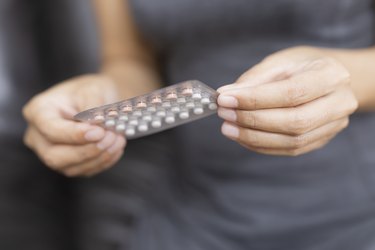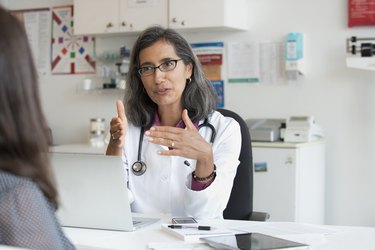
PCOS, or polycystic ovary syndrome, is a complex condition that has different symptoms from one person to another. As many as 1 in 10 people with ovaries of childbearing age in the United States have PCOS, which is also the leading cause of infertility, according to the Office of Women's Health (OWH).
But not everything about it is mysterious: This guide provides a deep dive into PCOS, from its causes to treatment tactics, which include both medications and lifestyle adjustments.
What Exactly Is PCOS?

People with PCOS experience excess levels of androgens (the so-called "male" hormone) and insulin resistance. These two hormonal imbalances can lead to an array of symptoms, including infertility, dark patches of skin around the neck and groin and under the breasts and difficulty losing weight.
Experts aren't certain exactly what causes PCOS. A person's genes, along with certain lifestyle factors, likely play a role.
Getting diagnosed and treated for PCOS is important, since the hormone imbalances that are central to the condition can increase your risk for endometrial cancer, according to the American Cancer Society.
While there's no cure for this condition, and no one treatment method, several medications and lifestyle adjustments, including taking hormonal birth control, can help manage the condition.
But diagnosing PCOS can be tricky; there is no single test that can identify the condition. Rather, doctors look for three key symptoms to confirm if a person has PCOS.
Discover the three main signs of PCOS, along with the most common treatment strategies.
How Does PCOS Affect Fertility?

When your hormones are out of balance — like with PCOS — your menstrual cycle can be, too. Ovulation (the process of an egg being released from the ovaries) can be interrupted, or you may not ovulate at all. Without ovulation, there is no egg released to be fertilized. In other cases, an egg may not develop properly.
A wide variety of treatments, including exercise, medications and surgical interventions, can help people with PCOS to conceive. Any treatment will be highly individualized, since symptoms vary greatly. Your doctor will help you determine the best treatment strategy to meet your specific needs.
Find out more about why PCOS often leads to fertility issues and the science-backed treatments that can help.
How Weight and PCOS Are Connected

People with PCOS are more likely to gain weight and also often find it harder to shed extra pounds. But it's unclear if extra weight causes PCOS, if PCOS causes weight gain or if it works both ways, per Johns Hopkins Medicine.
Higher levels of androgens may contribute to weight gain, per Penn Medicine, as can insulin resistance, which occurs when a person makes insulin, a hormone used to regulate glucose levels in the blood, but their body doesn't properly use it, according to the Centers for Disease Control and Prevention (CDC).
With additional weight, the symptoms of PCOS tend to worsen.
Losing weight, if you need to, can help ease symptoms of PCOS such as irregular periods and infertility, per the OWH. It can also reduce the risk of future complications like heart disease and type 2 diabetes.
Get more insight into how weight and PCOS are linked.
The Best Workouts if You Have PCOS

Mustering up the effort to exercise when you have PCOS isn't always easy. Often, symptoms like joint inflammation, fatigue and even heightened anxiety and depression can feel like a wet blanket that smothers any possible motivation to get moving.
And yet, it's worth pushing yourself to be active, since regular workouts can be a powerful tool for managing your symptoms. Moving more may help to keep blood sugar levels in check (which helps reduce the risk of insulin resistance), promote weight loss and improve your mood.
Learn the best mix of exercises to try if you have PCOS.
What to Eat if You Have PCOS

Changing what you eat, in some cases, can help treat insulin resistance associated with PCOS. Diet contributes to hormone health, and since PCOS is a condition of imbalanced hormones, what you eat can make a difference.
You'll want to be thoughtful about which diet you choose (if any): Some diets (such as intermittent fasting) don't help keep blood sugar stable. Many experts recommend focusing instead on eating more whole foods, including lean proteins and healthy fats.
Even with smart diet changes, some people with PCOS need additional therapies like a low-dose birth control pill and/or Metformin, a prescription medication that helps control insulin and blood sugar levels, per the Mayo Clinic.
While there is no single "PCOS diet" to follow, opting for certain foods (and avoiding others) can help people with PCOS manage insulin resistance, maintain a healthy weight and ease other symptoms.
Find ideas for what foods to add to your diet if you have PCOS.
Is this an emergency? If you are experiencing serious medical symptoms, please see the National Library of Medicine’s list of signs you need emergency medical attention or call 911.